AI for Business Courses: What to Learn and Why It Matters

Oussama Bettaieb
Marketing Director

Share to AI
Ask AI to summarize and analyze this article. Click any AI platform below to open with a pre-filled prompt.
AI is now impacting organizations across every industry. There are many AI for business courses available, yet most fall short of addressing a critical pain point: the gap between theoretical knowledge and practical implementation.
As an AI educator, Aloa helps organizations turn theoretical knowledge into competitive advantage. We go beyond simply teaching you the theories of what AI can do. We'll help you put them into practice in building your first pilot. Our AI development team takes your concepts and turns them into working solutions using your actual data and systems, so you go from learning to implementation without the usual technical roadblocks.
In this comprehensive guide, we’ll take a look at:
- Foundational AI concepts and advanced applications
- Essential AI skills
- Practical AI tools
- How to choose the best AI courses for your needs
Let’s dive in.
Overview of AI for Business
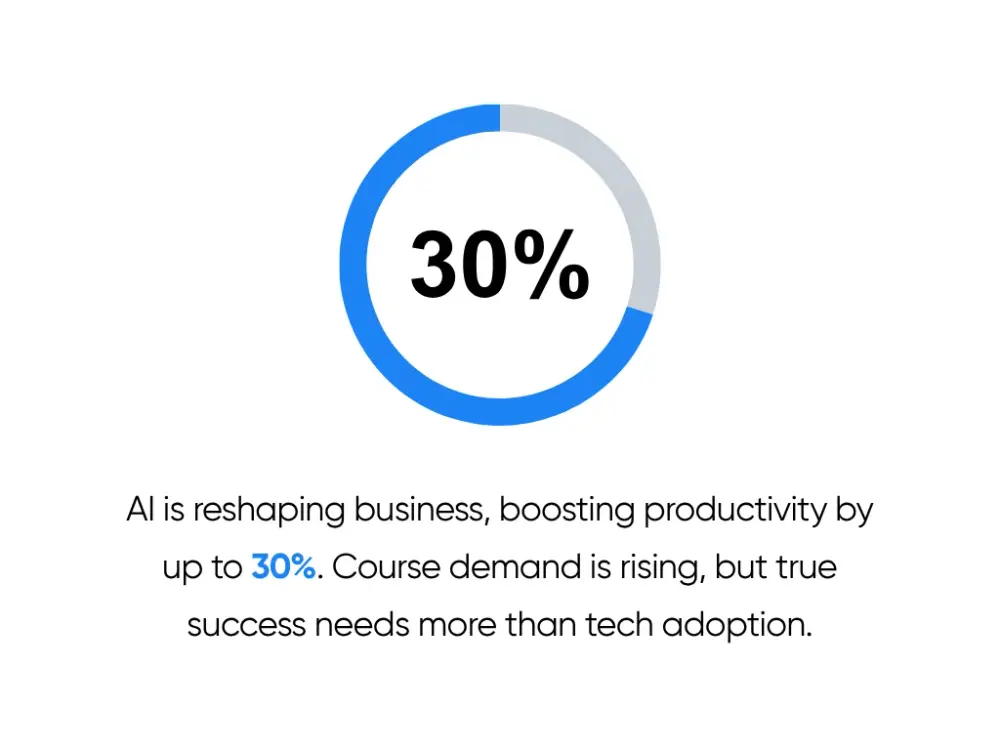
Business AI can improve productivity up to 30%, regardless of a company's size. Small businesses might use customer service chatbots, while larger ones can use AI-powered supply chain forecasting and email marketing personalization. AI’s wide range of use cases is why AI for business courses have skyrocketed in popularity.
The primary benefit of offloading business processes to AI is efficiency. Repetitive, time-consuming tasks can be handled faster and with fewer errors. This, in turn, leads to cost savings, better resource allocation, and faster decision-making. AI can also uncover patterns in customer behavior, automate compliance reporting, and scale operations without increasing overhead significantly.
What are AI for Business Courses?
AI for business courses are educational programs designed to help executives, managers, and business professionals understand how artificial intelligence can be applied within their organizations. These courses typically cover AI fundamentals, strategic implementation, ethical considerations, and real-world case studies without requiring deep technical expertise.
Leading institutions offer comprehensive programs that range from brief executive overviews to multi-week deep dives. Wharton's AI for Business Specialization provides a foundational understanding of machine learning applications across industries. Harvard Business School's AI Essentials focuses on strategic decision-making and competitive advantage through AI adoption.
For those seeking more technical depth, Stanford's AI for Business Professionals program bridges the gap between business strategy and implementation details. Wharton Executive Education's AI for Business offers an intensive format designed for senior leaders looking to drive organizational transformation.
We’ll break down the core concepts below.
Core Concepts in AI Courses
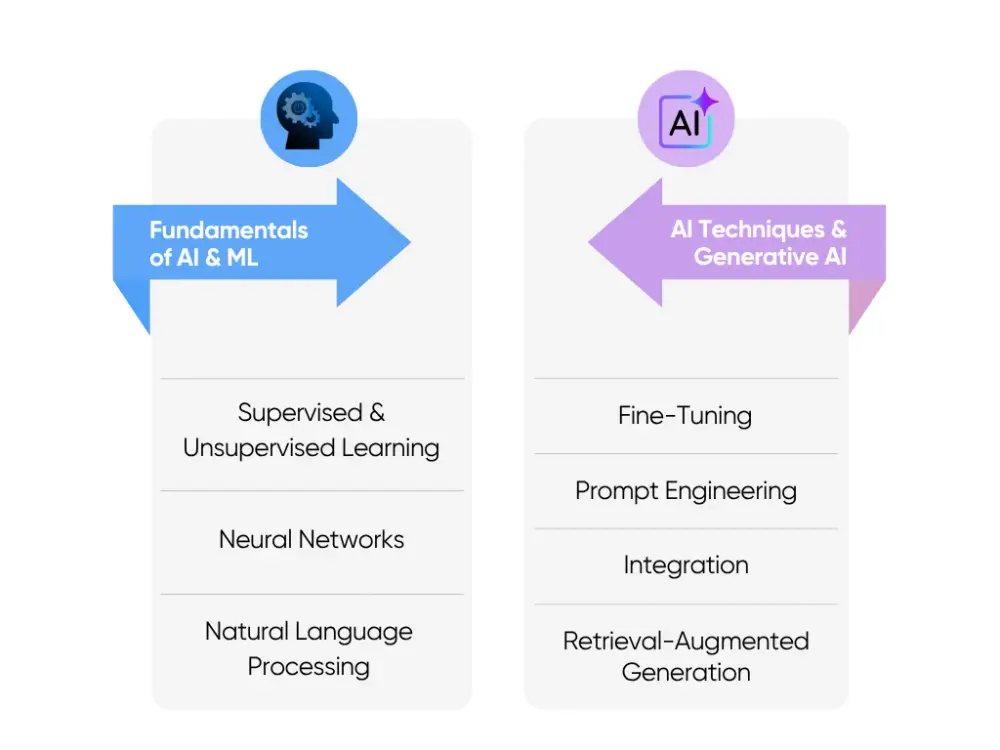
Courses like Stanford's AI for Business Professionals and Wharton’s AI for Business all start by introducing the core concepts: what is AI, how it works, and how to best use it to maximize productivity. We’ll dive into these core concepts that AI courses should cover:
Fundamentals of AI and Machine Learning
Understanding the foundational principles of AI and ML is essential for business leaders making strategic technology decisions:
- Supervised and unsupervised learning: Supervised learning predicts outcomes like customer churn or sales. Unsupervised learning finds hidden patterns to discover new market segments or operational inefficiencies.
- Neural networks: The computational structures powering AI applications from fraud detection to personalized recommendations. They enable businesses to automate complex decision-making processes.
- Natural language processing: The core tech in large language models that understands and generates human language. Powers chatbots, automated customer service, and content generation tools that reduce costs while improving customer experience.
Advanced AI Techniques and Generative AI
Since ChatGPT arrived in late 2022, generative artificial intelligence has become a mainstay in modern business education. Advanced courses for enterprise AI programs emphasize the following techniques:
- Fine-tuning: This process customizes AI models using your company's specific data to improve performance for your unique business needs. Snorkel AI helped enterprises achieve the same quality as expensive large models while reducing operational costs by 99.9% and requiring significantly less training data. This makes AI implementation more affordable and faster for mid-sized companies.
- Prompt engineering: The strategic design of instructions that guide AI to produce consistent, brand-appropriate outputs while reducing errors and improving customer satisfaction. TechSolutions Inc. transformed their customer support by reducing response times from 48 hours to real-time, directly improving customer retention and reducing churn rates through better service quality.
- Integration: AI tools connect to your current CRM, marketing platforms, and workflows without disrupting operations. This approach allows companies to enhance existing processes rather than replacing entire systems, reducing implementation risk and speeding time to value.
- Retrieval-Augmented Generation (RAG): This technique ensures AI responses use your company's current data and policies rather than outdated information. Companies using RAG systems like SlackGPT report faster decision-making and improved employee productivity. This is because teams can instantly access accurate, up-to-date company information without manual searching.
These courses generally promise to demystify AI technology and provide frameworks for evaluating AI opportunities within existing business processes. However, most focus heavily on strategy and theory, leaving participants to figure out the practical implementation challenges on their own.
At Aloa, we handle the practical side of things for you. Our AI prototypes are deeply attuned to the different nuances of your business, applying advanced features like RAG and fine-tuning in optimal ways to let you get the most out of your AI tools.
Specialized AI Applications
The novel content creation and data analysis capabilities of AI give it several specialized uses for business applications, particularly in marketing and finance. AI's human language capabilities make it excellent for interfacing with customers, creating content, and personalizing experiences. Its unmatched data processing abilities, on the other hand, are fantastic for data modeling and projection tasks in finance.
AI in Marketing and Finance
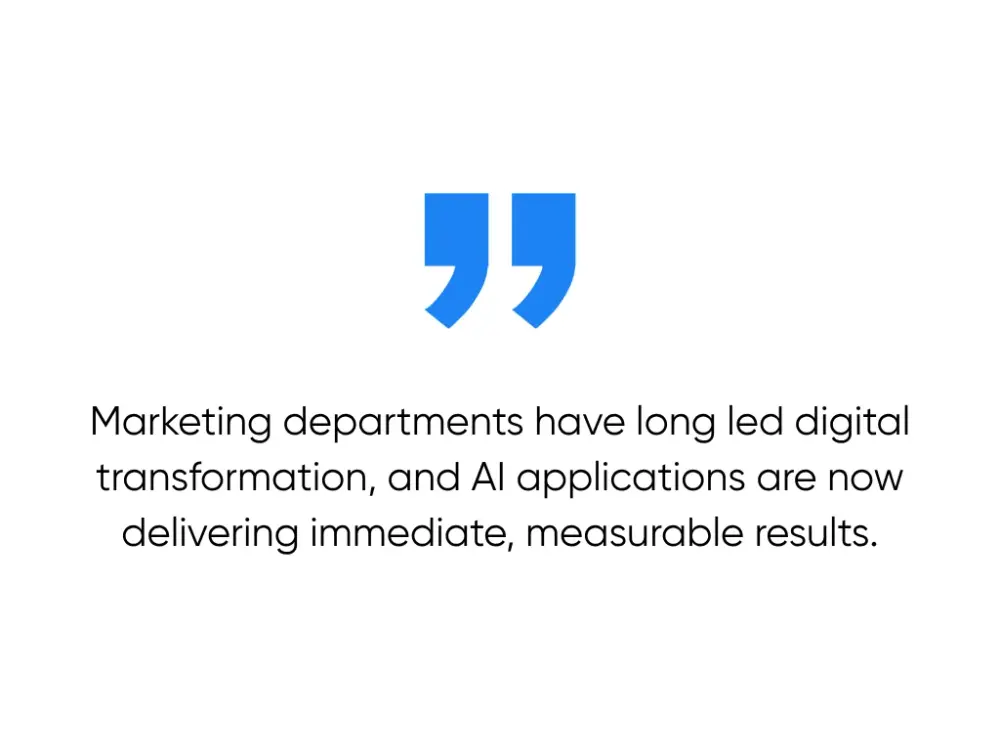
Marketing departments have long been digital transformation leaders. In the age of AI, specialized applications are driving immediate and measurable results.
The most mature applications use AI-powered content generation, personalization engines, and predictive customer lifetime value modeling. Here are some case studies:
- LinkedIn Learning's AI for Marketing course: Teaches professionals to leverage ChatGPT for copywriting, DALL-E for visual content, and sophisticated attribution analysis for campaign optimization, attracting over 500,000 annual enrollments.
- Wharton's executive AI program: Teaches portfolio optimization using machine learning, fraud detection through anomaly detection algorithms, and robo-advisor development.
- Stanford's AI for Finance specialization: Emphasizes regulatory compliance, with dedicated modules on explainable AI for financial decisions and audit trail maintenance.
Ethical AI and Governance
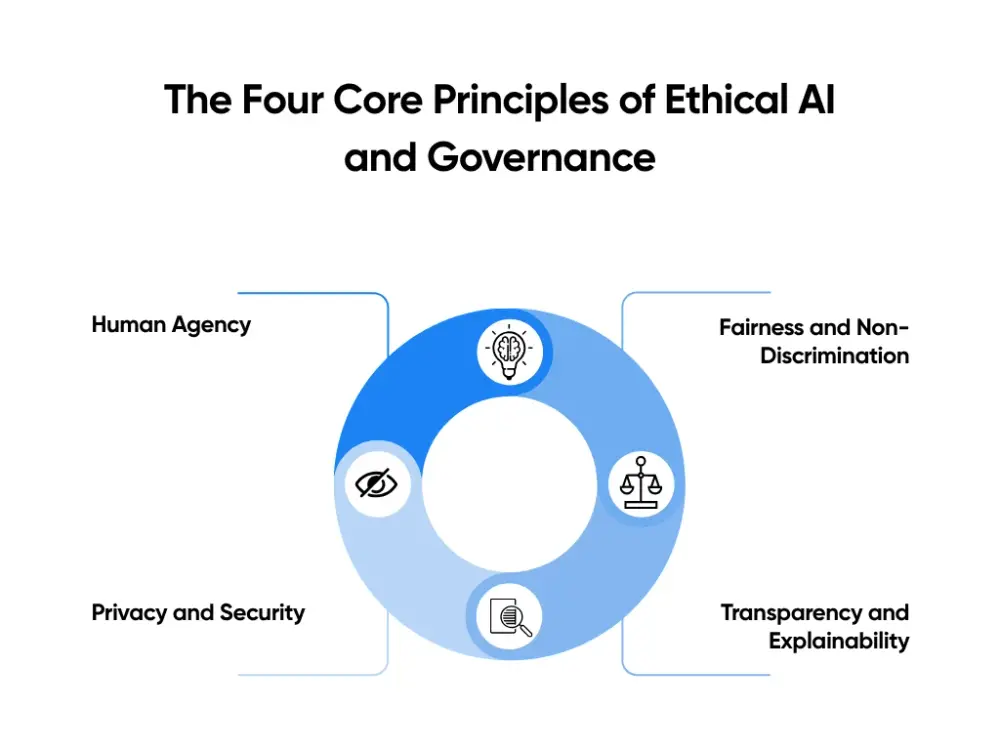
Ethical frameworks and governance structures have become mandatory components of comprehensive AI education programs. Stanford's Human-Centered AI Institute leads academic efforts by integrating ethics across all courses rather than treating it as a separate module. Their framework emphasizes four core principles:
- Human agency
- Fairness and non-discrimination
- Transparency and explainability
- Privacy and security
Practical governance frameworks teach risk assessment, stakeholder engagement, and compliance monitoring. Programs emphasize creating "AI ethics boards" that combine technical experts, business leaders, legal counsel, and affected community representatives to ensure comprehensive oversight and accountability.
Practical AI Skills and Tools
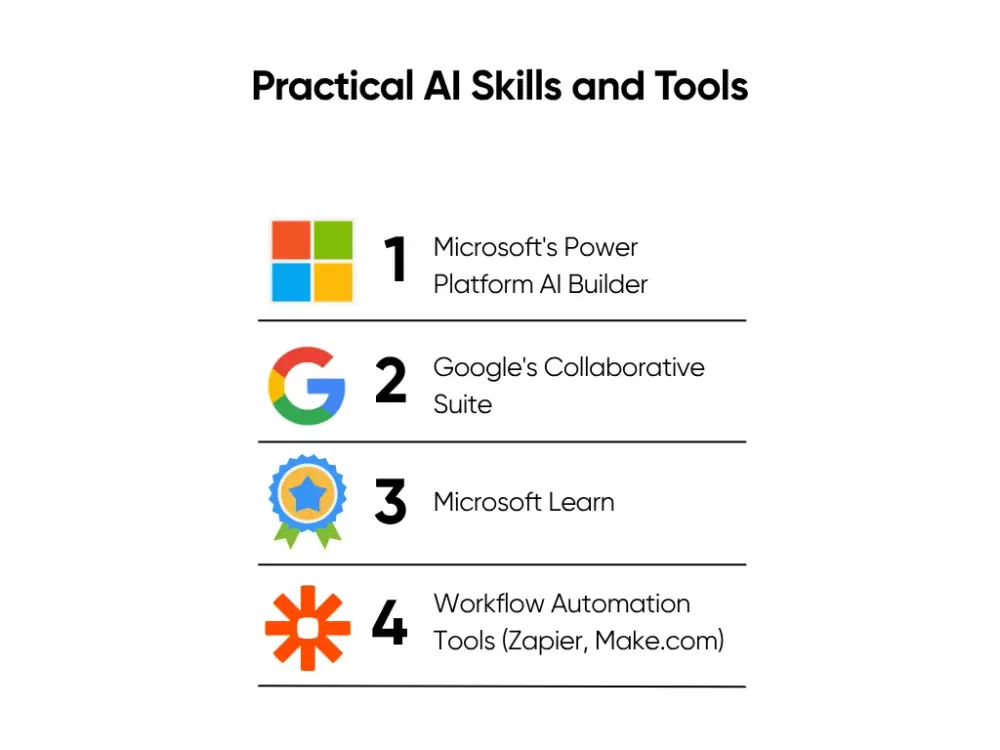
In terms of practical applications, AI business courses tend to prioritize no-code and low-code platforms. These tools enable those with no coding expertise to build AI-driven solutions like workflow automation and generating data insights without relying on software developers:
- Microsoft's Power Platform AI Builder: Enables point-and-click model creation for document processing, sentiment analysis, and object detection without requiring programming knowledge.
- Google's collaborative suite: Includes NotebookLM for research synthesis and Duet AI for workspace integration, making advanced AI capabilities accessible to non-technical professionals.
- Microsoft Learn: Teach integration with existing business systems, emphasizing API connections, data pipeline construction, and security protocols.
- Workflow automation tools like Zapier and Make.com: Demonstrate how businesses can chain multiple AI services for complex process automation. Deployment is typically achieved in 8 months, with returns in 13.
The accessibility offered by these platforms empowers business teams to experiment with AI tools directly. This makes adoption much faster and reduces bottlenecks between departments and IT.
Choosing the Right AI Course for Your Needs
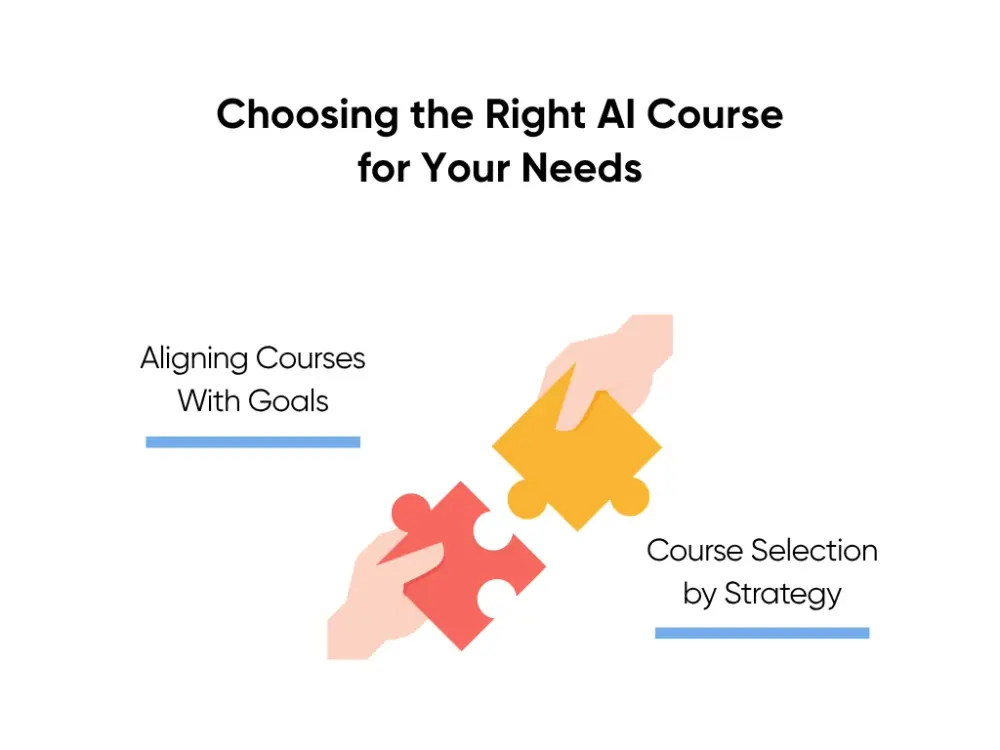
Each of the many AI courses on the market approach business AI learning differently. The best way to ensure you’ll be picking up lessons relevant to your business is by checking whether the course curriculum aligns with both your goals and the strategies you intend to follow to meet them.
Aligning Courses With Goals
Start by defining your specific business objectives and implementation timeline before exploring course options.
- Immediate AI implementations: Should prioritize practical, tool-focused programs. Microsoft Learn and LinkedIn Learning provide hands-on experience with specific platforms.
- Long-term AI strategies: Benefit from comprehensive frameworks offered by Stanford or Wharton that emphasize strategic thinking and organizational transformation.
Evaluate course content against your organization's current AI maturity level and technical capabilities. Advanced specializations can then target specific knowledge gaps with focused, intensive training tailored to your business needs.
Selecting Courses According to Your Strategy
Consider your organizational readiness, existing technical capabilities, and available resources when selecting AI education programs.
- Companies with strong technical teams: Can pursue advanced implementation-focused courses that dive deep into specific AI applications and integration strategies.
- Organizations lacking technical expertise: Should prioritize business strategy courses that focus on vendor evaluation, ROI assessment, and change management skills.
The most successful approach combines foundational business education with targeted technical training for key team members. This ensures leadership understands strategic implications while technical staff gain hands-on implementation skills, creating alignment across your organization for successful AI adoption.
Key Takeaways
Every AI for business course is gradually shifting from pure academic theory toward practical implementation. Business leaders no longer need extensive technical backgrounds to leverage AI effectively. By selecting the right courses and focusing on developing key skills, teams in mid-sized companies have an exciting opportunity to even compete with larger enterprises through AI-enabled processes.
If you’re looking to start your AI knowledge building, you should first assess your team’s current capabilities and resource availability, then build technical competency across key team members. This combination will set you up for sustainable AI integration.
Don’t just stop at learning how AI works through a course. Aloa's AI consulting services bridge the gap between classroom learning and real-world implementation. We’ll make sure your educational investments become measurable competitive advantages.
FAQs
How do AI courses enhance decision-making?
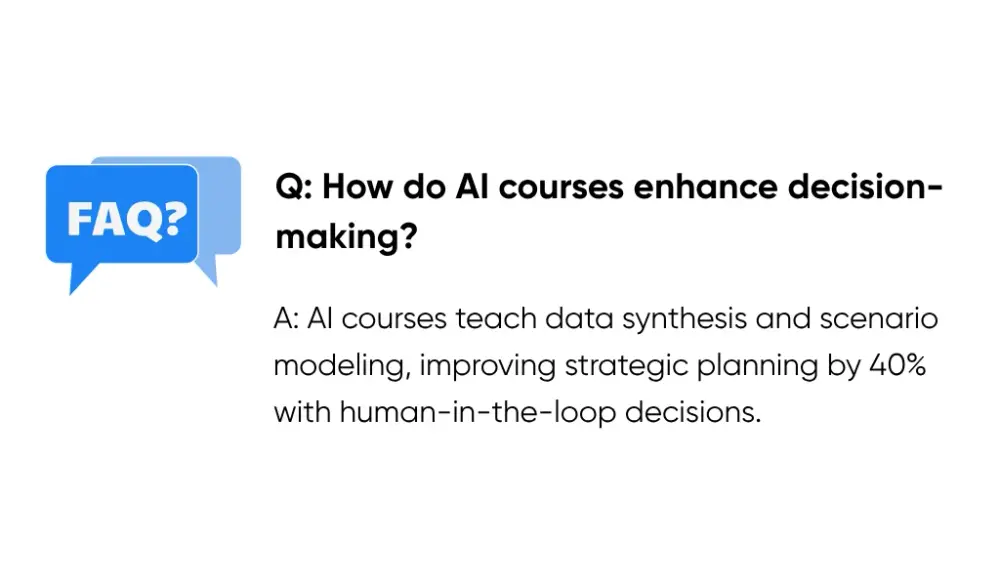
AI courses teach leaders to leverage data synthesis, pattern recognition, and scenario modeling while maintaining human judgment for strategic choices. Programs emphasize the "human-in-the-loop" approach, where AI generates options and insights but humans make final decisions based on context and values.
Executives trained in AI-augmented decision-making show 40% improvement in strategic planning quality metrics.
What are AI's marketing benefits?
AI transforms marketing through content generation, marketing analytics, personalization at scale, and campaign optimization. Professionals learn to use AI tools for copywriting, visual content creation, and predictive customer lifetime value modeling.
Marketing departments using AI achieve unprecedented personalization capabilities while reducing content creation costs and improving campaign performance metrics.
How can businesses ensure ethical use?
Ethical AI implementation requires comprehensive governance frameworks including risk assessment, stakeholder engagement, and compliance monitoring. Successful organizations create AI ethics boards combining technical experts, business professionals and leaders, legal counsel, and community representatives.
Regular algorithmic auditing, bias detection protocols, and diverse team composition ensure responsible AI deployment that serves all stakeholders effectively.